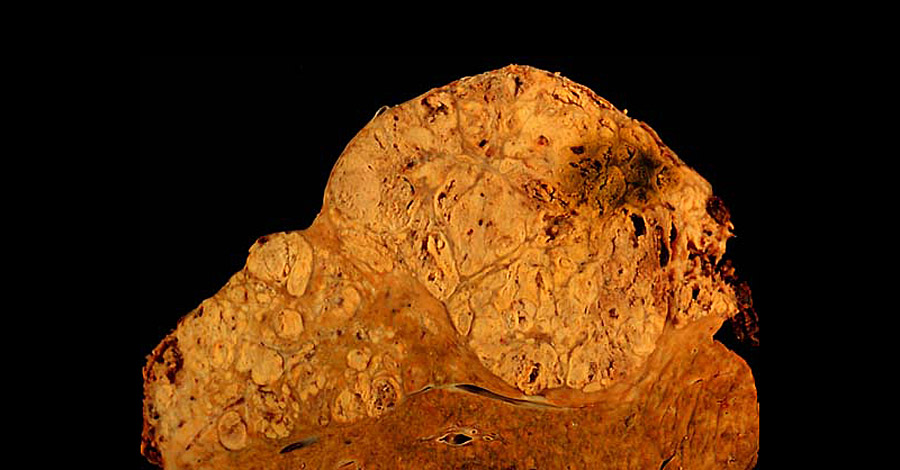Hope against liver cancer: A special form of ultrasound can help fight liver tumors and metastases — even if tumors are only partially destroyed, a study in mice shows. Although only 50 to 75 percent of liver tumors experienced a so-called fragmentation, 81 percent of the animals were completely cancer-free afterward. There were also no metastases, the researchers reported.
Liver cancer is one of the ten most common and deadly cancers worldwide, and the liver is an organ that is particularly affected by metastases. But despite significant advances and various treatment options, the affected patients’ chances of survival are relatively low: the five-year survival rate for HCC is only about 20 percent. One reason for this is that often the tumors cannot be completely removed.

Focused ultrasound ‘blasts’ cancer cells
However, a relatively new method that uses a particularly intense form of ultrasound to combat liver tumors can help. In this so-called tissue fragmentation, focused ultrasound pulses that last for a few microseconds but are of high intensity are directed at the tumor tissue. Ultrasound pulses cause the liquid to evaporate and thus generate small, rapidly growing bubbles in the tissue.
“This leads to a strong mechanical stress that destroys cells in the target tissues,” explain Tejaswi Wrlekar and colleagues from the University of Michigan. What remains is a type of cell core that the body breaks down over the course of several weeks. Preliminary tests of tissue fragmentation indicate that this procedure can not only effectively destroy cancerous tumors, but there is also evidence of an inhibitory effect even on tumors that are not directly affected.
Enough partial destruction
In order to follow through on this guidance, Worlikar and his team investigated what happens when hepatocellular carcinoma tumors are only partially destroyed — a condition that can often occur with current treatments. In their study, they destroyed only 50 to 75 percent of individual tumors in eleven mice with liver cancer, while the control group remained untreated.
It turned out that although a one-time ultrasound treatment directly destroyed only part of the tumors, the rest of the tumors also disappeared within a week. “Nine of the eleven animals – 81 percent – experienced a reduction in tumors after partial resection, then were tumor-free by the end of the study,” the research team says. “We have observed complete regression of both destroyed and non-destructive parts of the tumor.”
no metastases
This was confirmed by both magnetic resonance imaging and detailed histological analyzes of the tissues. Just seven days after the tissue was shredded, scientists could no longer notice any living cancer cells. At this point, new scar tissue was already forming in the place where the liver tumor had previously been, and it was not showing signs of degeneration.
Also positive: Mice treated with tissue fragmentation did not develop any metastases in the three months of the study, Worlikar and colleagues report. Although residual cancer cells could theoretically spread during this treatment, this fear has not been confirmed: “Our results indicate that fragmentation of tissue does not increase the risk of metastasis spreading,” the team says.
The immune response eliminates the remnants of cancer
According to the researchers, this lasting effect of ultrasound therapy can be explained, among other things, by the activation of the body’s immune system. Because after the tissue was fragmented, more immune cells migrated to the semi-destroyed tumors. “It is possible that the treatment elicited an antitumor immune response that contributed to complete tumor destruction while preventing metastasis,” the team wrote.
Therefore, ultrasound therapy can be a promising and relatively gentle option for liver cancer and possibly other forms of cancer as well. “Tissue fragmentation can overcome the limitations of currently available excision methods and provide safe, non-invasive tumor control,” says Wurlekar. According to the researchers, in previous studies, there were no significant side effects.
Clinical studies have begun – also in Germany
The first clinical study on the effect of fragmentation against liver cancer has already begun in the United States and Europe, clinics in Germany are also participating in #HOPE4LIVER – with initial positive results: “The first treatment was successfully carried out and the target tumor was destroyed. The patient was in good condition before and after treatment”, Says chief medical officer Matisse Planert of the Braunschweig Clinic.
The first patients were also successfully treated at the University Hospital in Magdeburg. In general, tests of the new method will be carried out at seven centers in Europe. At the same time, there are also the first animal experiments on the use of lithotripsy in brain tumors. (Cancer, 2022; doi: 10.3390/cancer 14071612)
Source: University of Michigan

“Total coffee aficionado. Travel buff. Music ninja. Bacon nerd. Beeraholic.”








More Stories
Coral Seeding: Artificial Insemination Makes Coral More Heat Tolerant
Fear, Anger, and Denial: How People Respond to Climate Change – Research
LKH Graz: Using radiation to combat heart arrhythmias